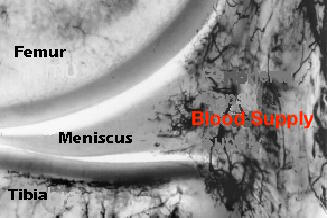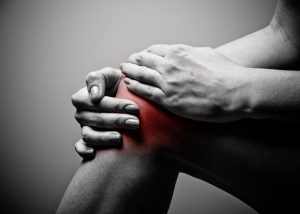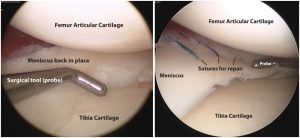Orthopaedics 360
A meniscus tear is one of the most common presenting conditions to an Orthopaedic surgeon. They can occur in any age group, and can be seen following both an acute injury, as well as in the chronic (long term) setting. In the acute setting, it is often seen following a twisting injury to the knee. This can occur during sporting endeavours, but can equally be seen in simple movements such as rising from a chair.
Meniscus Anatomy
The meniscus is a “C shaped” shaped piece of cartilage within the knee joint that is positioned between the femur (Thigh bone) and tibia (shin bone). Each knee joint has two menisci, an inner meniscus (medial meniscus), and outer meniscus (lateral meniscus). These menisci play an integral role within the knee joint, acting as ‘shock absorbers’ during normal activities. Damage to these structures can lead to early arthritis.
Meniscus tears are the most common knee injury
Symptoms of a meniscus tear
Do you have these
Patients with a meniscus tear characteristically present with:
- Pain along the inner or outer side of the knee joint
- ‘Clicking’ or ‘Catching’ feeling during knee movement
- Swelling of the joint
- Sensation of your knee ‘giving way’
Making the Diagnosis
Often the history and a thorough physical examination alone, can lead to the diagnosis of a meniscus tear. When the diagnosis is unclear or when other structures are thought to be involved, an MRI scan if often ordered. An MRI scan is highly accurate in confirming the diagnosis and also assess for other damage inside the joint. A meniscus tear can also be an incidental finding inside the knee at the time of arthroscopy when a different pathology is expected.
Meniscus Tear Treatment
The recommended treatment for a meniscus tear will depend on the age of the patient, the type of tear involved, and the current impairment. In the absence of a ‘locked’ knee, small tears may be managed conservatively in the acute setting with anti-inflammatories and rest. An arthroscopy is often warranted if these simple measures fail to improve the symptoms.
2 main arthroscopic surgical options
Our knee surgeons will discuss what is best for your meniscus tear
Partial Meniscectomy
This procedure is one of the most commonly performed orthopaedic procedures. Through tiny key hole incisions, the torn part of the menisci is removed with highly specialised instruments, which stabilises the remaining meniscus. This is frequently performed as a day procedure with rapid rehabilitation and no restrictions.
Meniscus Repair
Depending on the tear pattern, the timing of the injury, and the state of the remainder of the joint, the meniscus tear may be amenable to repair. This is performed via an arthroscopy using the a key hole technique and specialised suture anchors. To maximise the chances of successful healing, a period of non- weight bearing may be required. Successful repair results in a much better prognosis for the knee in years to come.
How not to rupture your ACL – Emily Peut
Our trusted partners in Physiotherapy - we have the pleasure of our continued collaboration with Physio Fit's Emily Peut. Emily has a passion and knowledge base for ACL (Anterior Cruciate Ligament) injuries in Adelaide. She has extensively studied and applied her...
ACL injuries – Rupture Repair and Rehabilitation
This week I have the pleasure of introducing Patrick Carbone from Inertia Health Group. He has been working with us for over 5 years with a focus on rehabilitation of our patients with their unique rehab protocols for total hip replacement, total knee replacement...
Mindfulness in Hip and Knee Surgery
Being aware of how you feel, and putting yourself into a good state of mind before, during and after surgery can have an impact on the outcomes of surgery, especially surgery as large as hip and knee replacement surgery. In this weeks article, we join Dr Sharon...
Disclaimer: Please note that this is general advice only - for more information, please consult your regular doctor, or obtain a referral to see a specialist orthopaedic surgeon.
Orthopaedics 360
Orthopaedics 360
P: (08) 7099 0188
F: (08) 7099 0171
Southern Specialist Centre
Orthopaedics 360
P: (08) 7099 0188
F: (08) 7099 0171
Health @ Hindmarsh
Orthopaedics 360
P: (08) 7099 0188
F: (08) 7099 0171




